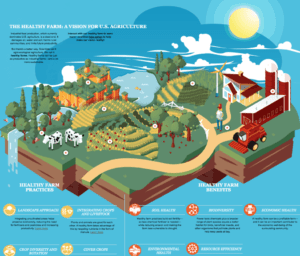Saturday, September 22nd, 2018
Damian Carrington, Environment Editor - Guardian (U.K.)
Stephan: The issue of micro-plastics may seem arcane, but it is directly affecting the entire ecosystem from oysters to mosquitoes, which means it is affecting you personally. Of course, it goes without saying that the Republican Congress and the Trump administration are doing zip, nada, nothing, about this. Micro-plastic pollution is a growing trend and I next expect to see papers coming out in the research journals reporting on changes in humans. It may be that we are just too stupid and greedy to put our survival first.

Fluorescent microplastics (bright green) are visible inside an adult mosquito. The particles can then spread to animals that eat the insects.
Credit: Al-Jaibachi et al/Biology Letters
Microplastic can escape from polluted waters via flying insects, new research has revealed, contaminating new environments and threatening birds and other creatures that eat the insects.
Scientists fed microplastics to mosquito larvae, which live in water, but found that the particles remained inside the animals as they transformed into flying adults. Other recent research found that half of the mayfly and caddisfly larvae in rivers in Wales contained microplastics.
Concern over microplastic pollution is rising rapidly as it is discovered in ever more places, and very little research has been done on how it may harm wildlife or humans. The particles can harbour bacteria or leach toxic chemicals. Microplastics have been found in tapwater around the world, in vast numbers in the oceans and sea creatures and even in remote Swiss mountains.
1 Comment
Saturday, September 22nd, 2018
Paul Krugman, Nobel Laureate Economist and Op-ed Columnist - The New York Times
Stephan: In the miasma of crap that spews out of the Trump administration and the Republican Congress like a North Carolina coal pond flooding into a healthy river, real things that affect real people are sweeping through the American economy. It is a study in stupidity and greed and, once again, Paul Krugman puts matters in order and perspective.

Aoxin Ibis Chinese electric car.
Credit: Green Car Reports
In normal times, Donald Trump’s announcement of tariffs on $200 billion worth of Chinese goods, bringing us closer to an all-out trade war, would have dominated headlines for days. Things being as they are, it was a below-the-fold story, drowned out by all the other scandals underway.
Yet Trump’s tariffs really are a big, bad deal. Their direct economic impact will be modest, although hardly trivial. But the numbers aren’t the whole story. Trumpian trade policy has, almost casually, torn up rules America itself created more than 80 years ago — rules intended to ensure that tariffs reflected national priorities, not the power of special interests.
You could say that Trump is making tariffs corrupt again. And the damage will be lasting.
Until the 1930s, U.S. trade policy was both dirty and dysfunctional. It wasn’t just that overall tariffs were high; who got how much tariff protection was determined through a free-for-all of horse-trading among special interests.
Read the Full Article
No Comments
Friday, September 21st, 2018
McKinley Corbley, - Good News Network
Stephan: Here is some lovely good news, sadly not in the U.S. but good news for all that. Increasingly it is beginning to look like America under Trump is deliberately downgrading itself to the second tier of nations in terms of future infrastructure and energy.
In one of the “biggest breaking stories of 2018” illustrating the ongoing transition from fossil fuels to renewables, a top power plant developer has just announced that it will be pivoting away from coal in favor of sustainable energy.
Japanese energy company Marubeni will no longer be building coal-powered plants. Instead, it will be doubling the sustainable energy capacity of its net power supply from 10% to 20% by 2023.
The conglomerate also plans on reducing its environmental impact by slashing its coal-powered energy of 3GW by half.
According to Japanese newspaper Nikkei, the company plans to avoid job loss by reassigning their employees currently working on coal-related projects to their renewable energy initiatives as they develop.
“Marubeni Corporation recognizes that climate change is a major issue shared by all of humanity,” said the company in a statement detailing their new initiative. “It is a problem that threatens the co-existence of the global environment and society, a problem that has an enormous effect on Marubeni’s business and its shareholders, and a problem that Marubeni believes must be dealt with swiftly.”
Marubeni is already one of the driving masterminds behind the Noor Abu Dhabi project: the largest solar project in the Middle […]
No Comments
Friday, September 21st, 2018
Ricardo Salvador, Union of Concerned Scientists/EcoWatch - EcoWatch
Stephan: More good news. It is now becoming clear that there is an economically viable alternative to industrial chemical mono-culture agriculture is emerging. Here is the story.
 At the Union of Concerned Scientists, we have long advocated agricultural systems that are productive and better for the environment, the economy, farmers, farmworkers and eaters than the dominant industrial system. We refer to such a system as our Healthy Farm vision. Based on comprehensive science, we have specified that healthy farm systems must be multifunctional, biodiverse, interconnected and regenerative.
At the Union of Concerned Scientists, we have long advocated agricultural systems that are productive and better for the environment, the economy, farmers, farmworkers and eaters than the dominant industrial system. We refer to such a system as our Healthy Farm vision. Based on comprehensive science, we have specified that healthy farm systems must be multifunctional, biodiverse, interconnected and regenerative.
The scientific case for agricultural systems that renew rather than diminish resources is comprehensive, and research demonstrates the productivity and agronomic feasibility of such systems. Yet, economically viable real-world examples are necessary to spur acceptance and adoption of such schemes. Further, we need to overcome the limitations of economic thinking and measures that were developed in the 19th century—when it seemed that the earth’s resources and its capacity to absorb waste were inexhaustible—and improve them to create more modern assessments, appropriate for the 21st century and beyond. A new report from our colleagues at Farmland LP, Delta Institute and Earth Economics will make a major contribution toward this end.
Our World […]
No Comments
Friday, September 21st, 2018
Stephan: I was first introduced to CBD by a couple I knew who had a daughter with a form of epilepsy that caused so many seizures that it came to dominate the entire family. They lived in North Carolina when they got the oil and eventually moved to Colorado to get legal access. Several other friends have since reported that the oil rubbed on arthritic joints brought relief. So I have been waiting for this article, which is to say I have been waiting for America's rapacious greed-driven pharmaceutical industry to make their move to get control of CBD. Well, the game is afoot.
 For years, consumers have benefitted from access to cheap, safe, and effective CBD oil supplements. But now the FDA says that CBD is a drug, not a supplement—a drug which will be sold for $32,500 a year.
For years, consumers have benefitted from access to cheap, safe, and effective CBD oil supplements. But now the FDA says that CBD is a drug, not a supplement—a drug which will be sold for $32,500 a year.
Legally the FDA could at any time remove all CBD supplements from the market, on its own volition, or if the drug company which holds drug market exclusivity requests FDA do so. Unless we change the rules, we may see a government-sponsored monopoly on CBD oil, and in the near future, additional monopolies on other cheap, safe, and effective supplements.
This is happening because of a back-channel that allows natural supplements to be turned into drugs by the FDA.
It works like this: if a company is investigating a substance as a drug, FDA rules give the company market exclusivity on that substance—even if it is currently being sold as a supplement.
There are two exceptions: if the supplement was “marketed in or as a dietary supplement” before 1994, or if a supplement company has filed a “new supplement” notification with the FDA before the company’s investigation began. […]
2 Comments



 At the
At the  For years, consumers have benefitted from access to cheap, safe, and effective CBD oil supplements. But now the FDA says that CBD is a drug, not a supplement—a drug which will be sold for
For years, consumers have benefitted from access to cheap, safe, and effective CBD oil supplements. But now the FDA says that CBD is a drug, not a supplement—a drug which will be sold for 








